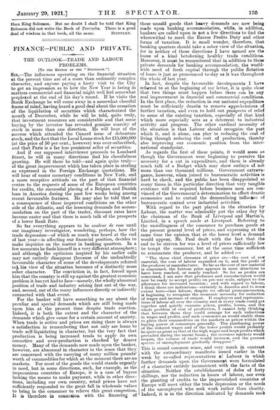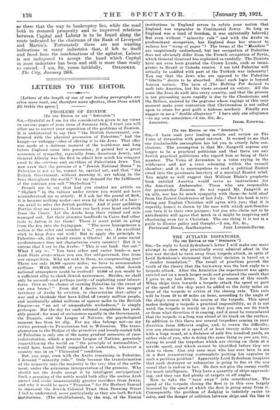FINANCE—PUBLIC AND PRIVATE.
THE OUTLOOK—TRADE AND LABOUR PROBLEMS.
[To THE EDITOR OF THE " SPECTATOR.")
SIR,—The influences operating on the financial situation at the present time are of a more than ordinarily complex character, and anyone paying a hasty visit to the City to get an impression as to how the New Year is faring in matters commercial and financial might well feel somewhat perplexed at the end of his day's round. If he visits the Stock Exchange he will come away in a somewhat cheerful frame of mind, having heard a good deal about the cessation of the liquidation of securities which characterized the month of December, while he will be told, quite truly, that investment resources are considerable and that some buying by the investor has revealed genuine scarcity of stock in more than one direction. He will hear of the success which attended the Cunard issue of debenture stock, and the fact that the Local Loans stock for £15,000,000 (at the price of 50 per cent., however) was over-subscribed, and that Paris is a far less persistent seller of securities. And if our supposed interviewer proceeds to Lombard Street, he will in many directions find his cheerfulness growing. He will there be told—and again quite truly— of the great improvement which has taken place in sterling as expressed in the Foreign Exchange quotations. He will hear of easier monetary conditions in New York, and a more receptive attitude on the part of that financial centre to the requests of some of the European countries for credits, the successful placing of a Belgian and Danish loan in America during the past few weeks being among recent favourable features. He may also be told that as a consequence of these improved conditions on the other side of the Atlantic, and the lessening demands for accom- modation on the part of the trader, discount rates have become easier and that there is much talk of the prospects of a lower Bank Rate.
So far everything appears to be couleur de rose until our imaginary investigator, wondering, perhaps, how the trade depression—of which so much was heard at the end of last year—is affecting our financial position, decides to make inquiries on the matter in banking quarters. In a few moments he finds himself in a very different atmosphere ; and although the optimism inspired by his earlier calls may not entirely disappear (because of the undoubtedly favourable character of some of the developments referred to), his view of the situation becomes of a distinctly more sober character. The conviction is, in fact, forced upon him that the country is still up against the greatest economic problem it has yet hadto face—namely, the wholly abnormal position of trade and industry arising first out of the war, and, second, out of the many influences directly or indirectly connected with that event.
For the banker will have something to say about the peculiar and special demands which are still being made upon him at the present time despite trade reaction. Indeed, it is both the extent and the character of the demands which give cause for a certain amount of anxiety. When trade is active and prices are rising there is always a satisfaction in remembering that not only are loans to trade self-liquidating in character, but the very fact that production is being increased tends to apply its own corrective and over-production is checked by dearer money. Many of the demands now made upon the banker, however, are abnormal in character in the sense that they are concerned with the carrying of many million pounds' worth of commodities for which at the moment there are no markets. For most of the goods the world stands urgently in need, but in some directions, such, for example, as the impecunious countries of Europe, it is a case of buyers lacking the means to make payment, while in other direc- tions, including our own country, retail prices have not sufficiently responded to the great fall in wholesale values to bring in the consumer to relieve this great congestion. It is therefore in connexion with the financing of these unsold goods that heavy demands are now being made upon banking accommodation, while, in addition, bankers are called upon in not a few directions to find the wherewithal to meet the Excess Profits Duty and other forms of taxation. It is small wonder, therefore, that banking quarters should take a sober view of the situation, for in neither of these directions I have named are the loans of a kind betokening healthy trade conditions. Moreover, it must be remembered that in addition to these private demands for banking accommodation, the world- wide need of fresh capital through the public flotation of loans is just as pronounced to-day as it was throughout the whole of last year. In fact, despite the favourable developments I have referred to at the beginning of my letter, it is quite clear that two things must happen before there can be any real improvement in financial and commercial conditions. In the first place, the reduction in our national expenditure must be sufficiently drastic to remove apprehensions of further taxation, and even to hold out prospects of relief to some of the existing taxation, especially of that kind which more especially acts as a deterrent to industrial activity and progress. The other cardinal necessity of the situation is that Labour should recognize the part which it, and it alone, can play in reducing the cost of living through reducing the cost of production, thereby also improving our economic position from the inter- national standpoint.
As regards the first of these points, it would seem as though the Government were beginning to perceive the necessity for a cut in expenditure, and there is already much talk of a Budget which may show outlays of not more than one thousand millions. Government extrava- gance, however, when joined to bureaucratic activities is hard to check, and the public has been disappointed so many times in this particular direction that very tangible evidence will be required before business men are con- vinced of the Government's determination to effect drastio economies and to curtail the demoralizing influence of bureaucratic control over industrial activities.
With regard to the part played in the situation by Labour, the matter was admirably put the other day by the chairman of the Bank of Liverpool and Martin's, Limited, in a speech made at Liverpool. Referring to the unwillingness of the consumer to purchase goods at the present general level of prices, and expressing at the same time the opinion that at the lower level a demand would appear, Mr. Paul dealt with the fact that the end to be striven for was a level of prices sufficiently low to tempt the consumer, but at the same time sufficient to remunerate the producer, and he added :— " The three chief elements of price are—the cost of raw material, the cost of labour expended on it, and the profit of the producer or manufacturer. So far as the cost of raw material is concerned, the bottom price appears in most directions to have been reached, or nearly reached. So far as profits are concerned, I am sure that producers and manufacturers would now be ready to accept profits on pre-war scale, subject to due allowance for increased taxation ; and with regard to labour, I think there are indications—certainly in America and to some extent here—that labour, despite its official pronouncements, is beginning to recognize the economic necessity for reduction of wages and increase of output. If employers and representa- tives of labour all over the country and in every trade could get together and quietly examine prices, profits, losses, and the whole problem of cost of production, I cannot help thinking that between them they could arrange for such reductions in wages and profits, and such economies as would enable them to place their commodities on the markets at prices within the buying power of consumers generally. The purchasing power of the reduced wages and of the lower profits would probably be quite as great as that of the high wages and large profits which prevailed during the recent boom ; the overseas markets would reopen, the volume of trade would increase, and the present spectre of unemployment gradually disappear."
This is sound common sense, and very much in contrast with the extraordinary manifesto issued earlier in the week by so-called representatives of Labour in which further demands upon the Government were formulated of a character entirely inconsistent with the facts of the situation. Neither the establishment of doles of forty shillings, nor the reduction in hours of labour, nor even the granting of credits to the impoverished countries of Europe will meet either the trade depression or the needs of the unemployed who seek work rather than charity. Indeed, it is in the direction indicated by demands such as these that the way to bankruptcy lies, while the road both to restored prosperity and to improved relations between Capital and Labour is to be found along .the route indicated by the chairman of the Bank of Liverpool and Martin's. Fortunately there are not wanting indications in many industries that, if left to itself and freed from the machinations of the agitator, Labour is not indisposed to accept the hand which Capital in most industries has been and still is more than ready



































 Previous page
Previous page